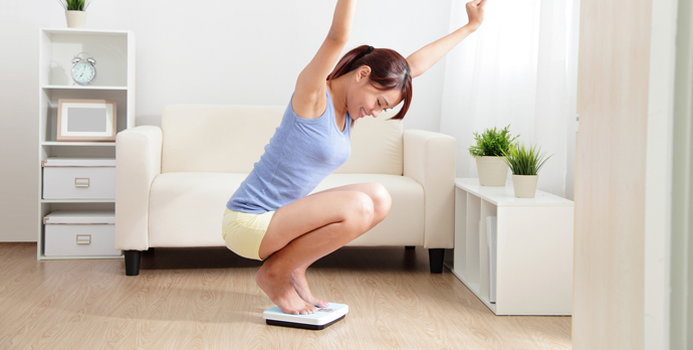Think about your daily routine. You shower, you brush your teeth, you get dressed, and so on. But should stepping on the scale become a part of your daily regimen? Scientists think so.
Contrary to popular belief that daily weighing should be avoided because it may lead to frustration, discouragement, or sadness, it may actually be beneficial. Researchers out of Cornell University wanted to take a closer look at daily weigh-ins and weight fluctuations (weight gain, weight loss, or no change at all) to see if it helped.
The Research
A two-year study involving 162 gym-goers (adults, categorized as overweight or obese) found that the participants who were asked to record their weight each day and then chart their results were more prone to lose a significant amount of weight and keep the weight off.
Another study that included new college students had one group weigh themselves every day while the other group skipped the scale. The group that stuck to the daily weigh-ins gained no weight while the other freshmen gained 5 pounds on average.
An additional study with 92 overweight participants revealed that the individuals who were instructed to weigh themselves daily on a digital scale which then sent their numbers to a website where they, along with weight-loss counselors, could see the results, lost significantly more weight. The counselors provided educational tips along with encouragement.
What’s important to note is the fact that researchers in all of these studies observed no negative outcomes, such as depressed mood or signs of disordered eating (binging, purging, etc.). Experts believe that weighing yourself daily can help you stay focused, maintain motivation, and keep you accountable.
Of course, experts also believe daily weigh-ins are not for everyone. For some, it works better for them to notice a change in how their clothes fit or changes in their waist circumference to help them avoid equating the number on the scale with self-worth.
Make It Work For You
There are a couple of tips when it comes to daily weigh-ins.
- Weigh yourself at the same time every day. It doesn’t matter whether you pick the morning, afternoon, or evening, but stick to one time of day. Your weight fluctuates throughout the day due to a number of factors (most notably, hydration status), but you’re more likely to get an accurate portrait of any loss or gain if you weigh yourself at a consistent time.
- Use the same scale. Use either your home scale or the scale at the gym, but not both. If one of them is off by even a pound or two, the discrepancy between the two could provide false information.
- Don’t get too discouraged if the weight is not coming off fast enough, or, worst case scenario, you gain weight. Dust yourself off, refocus, and make some adjustments.
If stepping on your scale is a daily ritual, it may be helping you lose weight or, in the very least, prevent weight gain, which can sometimes go unnoticed over time without a scale to keep you accountable.
A Word of Caution
These studies did not involve any participants who had a history of an eating disorder as these individuals would likely obsess about weight and turn to unhealthy behaviors such as extreme calorie-cutting or binging.
[Image via Getty]



